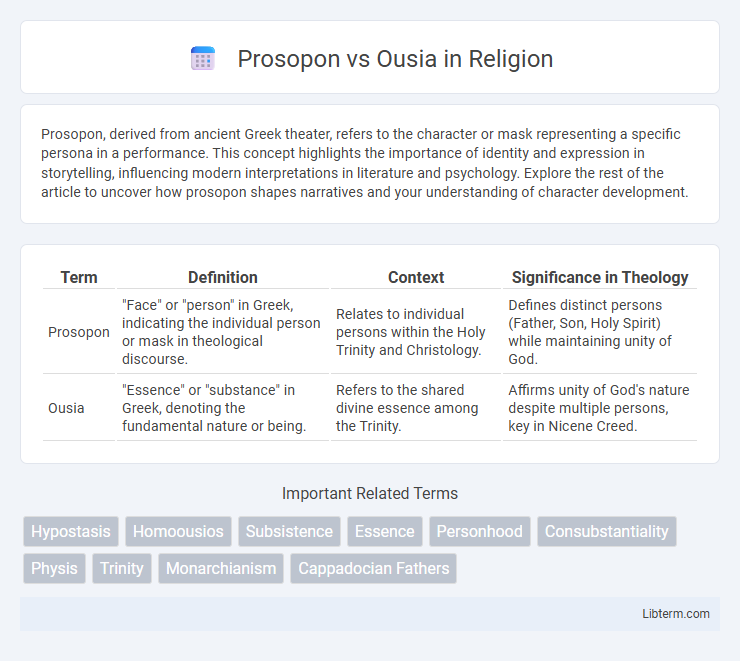Prosopon, derived from ancient Greek theater, refers to the character or mask representing a specific persona in a performance. This concept highlights the importance of identity and expression in storytelling, influencing modern interpretations in literature and psychology. Explore the rest of the article to uncover how prosopon shapes narratives and your understanding of character development.
Table of Comparison
| Term | Definition | Context | Significance in Theology |
|---|---|---|---|
| Prosopon | "Face" or "person" in Greek, indicating the individual person or mask in theological discourse. | Relates to individual persons within the Holy Trinity and Christology. | Defines distinct persons (Father, Son, Holy Spirit) while maintaining unity of God. |
| Ousia | "Essence" or "substance" in Greek, denoting the fundamental nature or being. | Refers to the shared divine essence among the Trinity. | Affirms unity of God's nature despite multiple persons, key in Nicene Creed. |
Introduction to Prosopon and Ousia
Prosopon and Ousia are fundamental terms in classical metaphysics and Christian theology, defining different aspects of being and identity. Prosopon refers to the "person" or the individual manifestation of a being, emphasizing relational and personal attributes, while Ousia denotes the "essence" or substance underlying existence, representing the shared nature or what a thing is in itself. Understanding the distinction between Prosopon as the particular, relational identity and Ousia as the universal essence is crucial for exploring debates on the Trinity and individual identity in philosophical and theological contexts.
Historical Context of the Terms
Prosopon and ousia are pivotal terms in early Christian theology, defining the relationship between personhood and substance within the doctrine of the Trinity. Ousia, derived from Greek philosophy, primarily denotes "essence" or "being," reflecting the unified divine nature shared by the Father, Son, and Holy Spirit. Prosopon, originally meaning "face" or "mask," evolved to signify distinct persons or individual expressions of the single divine essence, a critical distinction crystallized during the Councils of Nicaea (325 AD) and Chalcedon (451 AD) amid Christological debates.
Definitions: Prosopon Explained
Prosopon, in theological terms, refers to the "face" or "person" as the self-manifestation of an individual, emphasizing personal identity within the Trinity. Ousia, by contrast, denotes the essence or substance, representing the shared divine nature among the Father, Son, and Holy Spirit. Understanding Prosopon highlights how distinct persons exist in one divine being without division of the divine essence.
Definitions: Ousia Explained
Ousia, derived from Greek philosophy, refers to the essential "being" or "substance" that defines the true nature of an entity, distinct from its attributes or manifestations. In theological discourse, particularly in Christian Trinitarian doctrine, ousia represents the shared divine essence or substance common to the Father, Son, and Holy Spirit. Prosopon, by contrast, denotes the individual "person" or external manifestation, emphasizing relational identity without altering the unified essence described by ousia.
Prosopon vs Ousia: Key Differences
Prosopon refers to the individual person or face as a distinct identity in theological and philosophical contexts, while Ousia denotes the underlying essence or substance that constitutes the true nature of a being. The key difference lies in Prosopon representing a relational and personal manifestation, whereas Ousia embodies the fundamental reality or existence shared among entities. Understanding the distinction between Prosopon and Ousia is crucial in debates on the Trinity and metaphysics, where the terms delineate personhood versus essence.
Theological Significance in Christian Doctrine
Prosopon and Ousia are foundational concepts in Christian Trinitarian theology, where Prosopon refers to the "person" or individual identity and Ousia denotes the "essence" or substance shared by the Father, Son, and Holy Spirit. Theological significance lies in maintaining that while each Prosopon is distinct and relational within the Godhead, they all possess one common Ousia, affirming both unity and diversity in the Trinity. This distinction safeguards the orthodox doctrine against Modalism, which denies personal distinctions, and Tritheism, which separates the divine essence into multiple gods.
Usage in Early Church Councils
The distinction between Prosopon and Ousia was central to theological debates in early Church Councils such as Nicaea (325 AD) and Chalcedon (451 AD), where theologians clarified the concept of Christ's dual nature. Ousia refers to the essence or substance shared by the Trinity, while Prosopon denotes the individual person or appearance, allowing the councils to affirm one essence in three persons. This differentiation helped resolve controversies like Arianism and Nestorianism by emphasizing the unity of Christ's divine and human natures within one person.
Impact on Trinitarian Controversies
Prosopon and ousia were pivotal in shaping the theological understanding during the Trinitarian controversies, where prosopon referred to the "person" or individual manifestation, and ousia denoted the "essence" or substance shared by the Father, Son, and Holy Spirit. The distinction clarified the unity and diversity within the Trinity, with the Cappadocian Fathers emphasizing one ousia in three prosopa to counter Arianism and Sabellianism. This nuanced theological framework profoundly influenced the Nicene Creed's development, solidifying orthodox Christian doctrine on the consubstantial nature of the Godhead.
Modern Interpretations and Debates
Modern interpretations of Prosopon versus Ousia in theological discourse examine the nuanced distinctions between "person" and "essence" within Trinitarian doctrine, emphasizing relational identity over metaphysical substance. Contemporary debates highlight how Prosopon underscores the relational and personal aspect of the divine, while Ousia refers to the shared, unified essence of the Godhead, influencing ecumenical dialogues and Christological formulations. Recent scholarship often prioritizes the dynamic interplay between these concepts to resolve historical tensions in understanding the nature of the Trinity and individual divine persons.
Conclusion: Relevance of Prosopon and Ousia Today
Prosopon and ousia remain crucial in contemporary theological and philosophical discussions for understanding personhood and essence, particularly in Christian Trinitarian doctrine where prosopon denotes an individual person and ousia refers to the underlying substance or being. Their distinction helps clarify debates on identity, individuality, and unity within complex entities such as the Trinity or human nature. The relevance of these concepts persists in modern metaphysical inquiries and ecumenical dialogues, emphasizing the ongoing importance of classical categories in explaining relational and ontological realities.
Prosopon Infographic

 libterm.com
libterm.com